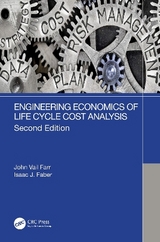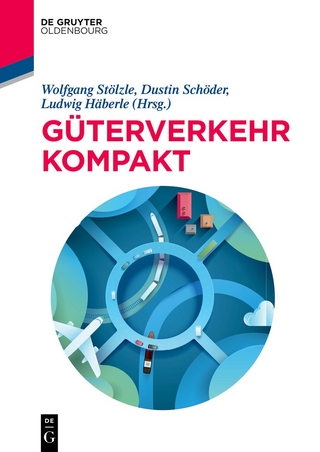
Engineering Economics of Life Cycle Cost Analysis
CRC Press (Verlag)
978-1-138-60678-4 (ISBN)
- Titel erscheint in neuer Auflage
- Artikel merken
Engineering has changed dramatically in the last century. With modern computing systems, instantaneous communication, elimination of low/mid management, increased complexity, and extremely efficient supply chains, all have dramatically affected the responsibilities of engineers at all levels. The future will require cost effective systems that are more secure, interconnected, software centric, and complex. Employees at all levels need to be able to develop accurate cost estimates based upon defensible cost analysis. It is under this backdrop that this book is being written.
By presenting the methods, processes, and tools needed to conduct cost analysis, estimation, and management of complex systems, this textbook is the next step beyond basic engineering economics.
Features
Focuses on systems life cycle costing
Includes materials beyond basic engineering economics, such as simulation-based costing
Presents cost estimating, analysis, and management from a total ownership cost perspective
Offers numerous real-life examples
Provides excel based textbook/problems
Offers PowerPoint slides, Solutions Manual, and author website with downloadable excel solutions, etc.
Dr. John V. Farr is currently an adjunct faculty at the University of Central Florida and in the School of Business at Clarkson University and a Principal Subject Matter Expert for Applied Research Associates conducting cost and risk analysis. He is a Professor Emeritus of Engineering Management at the United States Military Academy at West Point and was a Professor and the Founding Director of the Center for Nation Reconstruction and Capacity Development from 2010 until 2017. From 2007 to 2010 he was a Professor of Systems Engineering and Engineering Management and Associate Dean for Academics in the School of Systems and Enterprises at Stevens Institute of Technology. He was the Founding Director of the Department of Systems Engineering and Engineering Management at Stevens from 2000 to 2007. Before coming to Stevens in 2000, he was a Professor of Engineering Management at the United States Military Academy at West Point where he was the first permanent civilian professor in engineering and Director of their Engineering Management Program. Dr. Farr is a former past president and Fellow of American Society for Engineering Management (ASEM) and a Fellow of the American Society of Civil Engineers (ASCE). He is a former editor of the Journal of Management in Engineering and the founder of the Engineering Management Practice Periodical. He has authored or edited over 200 technical publications to include five books, seven book chapters, and over 90-refereed publications mainly on cost analysis, infrastructure, engineering education, engineering management, and systems engineering. Dr. Farr earned his undergraduate degree from Mississippi State University and Masters and PhD in Civil Engineering from Purdue and the University of Michigan, respectively. Dr. Farr is also a member of Chi Epsilon, a Founding Member of Epsilon Mu Eta, and Phi Kappa Phi honor societies. He is a member of the International Council of Systems Engineering (INCOSE), ASCE, and ASEM. He is also a registered civil engineer in New York, Florida, and Mississippi and a certified project management professional (PMP). Dr. Farr has served on numerous defense national and academic advisory boards to include membership on the Army Science Board from 2002 through 2010 and a member of the Air Force Studies Board of the National Academies from 2006 through 2012. He has served as a consultant to numerous companies and government agencies and worked in Afghanistan, Africa, Vietnam, and the Marshall Islands on a wide variety of economic and capacity development and assessment projects. He taught at the University of Technical Education, Ho Chi Minh City, Vietnam in 2013 as a Fulbright Specialist. Isaac J. Faber an active duty officer in the United States Army and is attending Stanford University through the Army Operations Research Systems Analysis (ORSA) advanced civil schooling program. His research focuses on advanced techniques for cyber security, early warning of complex attacks, and the costing of complex computer systems. While at Stanford he was involved in the startup of a company focused on managing data mining solutions. He previously served as the lead data scientist at the Army’s new cyber warfare unit. In that role, he guided the development and architecture of an operational cyber analytics platform. He also served a three-year tour at the United States Military Academy at West Point where he was promoted to the rank of Assistant Professor. At West Point he served in Department of Systems Engineering and taught courses in decision analysis and engineering economy. He also maintained an active sponsored research program in logistics and cyber warfare. Though still an active duty Army officer, he has found time to produced four peer-reviewed journal articles and nine peer-reviewed conference articles, and six working papers. He is a Ranger qualified combat veteran of Iraq with a Bronze Star and Combat Infantry badge. He has served as the Institute of Industrial and Systems Engineering Chair of the Engineering Economy Division. He holds degrees in Computer Information Systems (B.S) from Arizona State University and Industrial Engineering (M.S.) from the University of Washington.
1. Overview of Systems Life Cycle Costing. Section: 1. The Mathematics of Engineering Economy. 2. The Science of Engineering Economics: Understanding the Time Value of Money. 3. Advanced Economic Analysis of Alternatives. 4. The Basic Theory of Interest. 5. Simulation-Based Costing. 6. Life Cycle Framework and Techniques. Section: 2. Estimation of complex Systems. 7. Costing of Complex Systems. 8. Software-Intensive Systems. 9. Cost Estimating Techniques. Section: 3. Cost Management. 10. Costing and Managing Off-the-Shelf Systems. 11. Project Management’s Role in Life Cycle Costing. 12. Use of Cost Metrics and Ratios. Appendix. Interest Factors.
| Erscheinungsdatum | 05.11.2018 |
|---|---|
| Zusatzinfo | 146 Illustrations, black and white |
| Verlagsort | London |
| Sprache | englisch |
| Maße | 156 x 234 mm |
| Gewicht | 657 g |
| Themenwelt | Technik |
| Wirtschaft ► Betriebswirtschaft / Management ► Logistik / Produktion | |
| ISBN-10 | 1-138-60678-2 / 1138606782 |
| ISBN-13 | 978-1-138-60678-4 / 9781138606784 |
| Zustand | Neuware |
| Haben Sie eine Frage zum Produkt? |
aus dem Bereich



